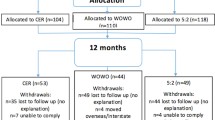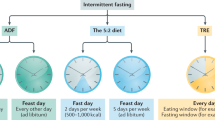Abstract
OBJECTIVE: To evaluate the short-term effects of sibutramine on appetite and eating behaviour and whether these effects are related to the long-term therapeutic outcome.
STUDY DESIGN: Short-term: randomised, double-blind, placebo-controlled, within-subject design. Long-term: prospective open clinical trial.
SUBJECTS: A total of 36 obese (nine men/27women) with a body mass index of 39.3±4.3 (mean±s.d.) (range 30.2?–?45.2)?kg/m2 and age 44.4±12.1?y.
PROCEDURE AND METHODS: First phase—short-term effects: At baseline, the subjects were treated for 14 days with 15?mg sibutramine/placebo (period 1) followed by a 2 weeks single-blind placebo washout period, the subjects received the alternative therapy for another 14 days (period 2). At baseline, and at day 14 in each treatment period the subjects arrived fasting to the laboratory for a standardised breakfast and an ad libitum standardised lunch using the VIKTOR set-up (a universal eating monitor) to evaluate the microstructure of the eating behaviour (ie amount of food consumed and eating rate). Visual Analogue Scales were applied before and after the meals as well as every hour between the meals to monitor the appetite. During this first phase, subjects were encouraged to keep their habitual eating habits. Second phase—long-term effects: All subjects received 10 months open treatment with 15?mg sibutramine and dietary advice in monthly group sessions with a dietitian. On the last day of this treatment period, the subjects returned to repeat the measurements of appetite and eating behaviour using the same test procedure as during the first phase of the study.
RESULTS: First phase: Sibutramine influenced appetite and eating behaviour that could be registered after only 14 days of treatment. The amount of food consumed at lunch on VIKTOR was reduced by 16% by sibutramine compared to placebo, 335±123?g vs 399±126?g (P<0.0001). Second phase: Responders and nonresponders were defined as those who ate less vs more food on VIKTOR when treated with sibutramine compared to the baseline food intake in the first phase of the study. The weight reduction was greater for responders 11.8±6.2 (mean±s.d.)?kg compared to nonresponders 6.8±2.7 (mean±s.d.)?kg (P<0.05).
CONCLUSION: Short-term effects of sibutramine on appetite and eating behaviour were identified such as a reduction in food intake and in ratings of subjective motivation to eat. Short-term sibutramine effects on eating behaviour are to some extent related to the long-term therapeutic outcome in obese subjects.
This is a preview of subscription content, access via your institution
Access options
Subscribe to this journal
Receive 12 print issues and online access
$259.00 per year
only $21.58 per issue
Buy this article
- Purchase on Springer Link
- Instant access to full article PDF
Prices may be subject to local taxes which are calculated during checkout





Similar content being viewed by others
References
WHO. Obesity, preventing and managing the global epidemic. World Health Organisation: Geneva; 1997.
McNeely W, Goa KL . Sibutramine—a review of its contribution to the management of obesity. Drugs 1998; 56: 1093–1124.
James WP, Astrup A, Finer N, Hilsted J, Kopelman P, Rössner S, Saris WHM, Van Gaal LF . Effect of sibutramine on weight maintenance after weight loss: a randomised trial. Lancet 2000; 356: 2119–2125.
Lissner L, Barker DJP, Blundell JE, Dietz WH, Epstein LH, Jeffery RW, Remschmidt H, Rolls BJ, Rössner S, Saris WHM . Group report: what are the bio-behavioral determinants of body weight regulation? In: Bouchard C, Bray GA (eds.). Regulation of body weight: biological and behavioral mechanisms, John Wiley & Sons; Chichester, New York, Brisbane, Toronto, Singapore; 1996. pp 159–177.
Barkeling B, Rössner S, Björvell H . Effects of a high-protein meal (meat) and a high-carbohydrate meal (vegetarian) on satiety measured by automated computerized monitoring of subsequent food intake, motivation to eat and food preferences. Int J Obes Relat Metab Disord 1990; 14: 743–751.
Barkeling B, Rössner S, Sjöberg A . Methodological studies on single meal food intake characteristics in normal weight and obese men and women. Int J Obes Relat Metab Disord 1995; 19: 284–290.
Lindgren AC, Barkeling B, Hägg A, Ritzén M, Marcus C, Rössner S . Eating behaviour in Prader–Willi syndrome, normal weight and obese control groups. J Pediatr 2000; 137: 50–55.
Meyer J-E, Pudel V . Experimental studies on food intake in obese and normal weight subjects. J Psychosom Res 1972; 16: 305–308.
Blundell JE, Rogers PJ, Hill AJ . Evaluating the satiating power of foods: implications for acceptance and consumption. In: Solms J (ed). Chemical composition and sensory properties of food and their influence on nutrition. Academic Press; London; 1988. pp 205–219.
Nordic Nutrition Recommendations. Scand J Nutr 1996; 40: 161–165.
Linné Y, Barkeling B, Rössner S, Rooth P . Vision and eating behavior. Obes Res 2002; 10: 92–95.
Barkeling B, Granfelt Y, Björck I, Rössner S . Effects of carbohydrates in the form of pasta and bread on food intake and satiety in man. Nutr Res 1995; 15: 467–476.
Hylander B, Barkeling B, Rössner S . Eating behaviour in continuous ambulatory peritoneal dialysis and hemodialysis patients. Am J Kidney Dis 1992; 6: 592–597.
Hylander B, Barkeling B, Rössner S . Changes in patients' eating behavior: in the uremic state, on continuous ambulatory peritoneal dialysis treatment, and after transplantation. Am J Kidney Dis 1997; 29: 691–698.
Näslund E, Barkeling B, King N, Gutniak M, Blundell J, Holst J, Rössner S, Hellström P . Energy intake and appetite are suppressed by glucagon-like peptide-1 (GLP-1) in obese men. Int J Obes Relat Metab Disord 1999; 23: 304–311.
Rössner S, Barkeling B, Asp A, Flaten H, Fuglerud P . Effects of weight loss on single meal eating behaviour in obese subjects. Int J Obes Relat Metab Disord 1996; 20: 287–289.
Rössner S, Barkeling B, Erlanson-Albertsson C, Larsson P, Wåhlin-Boll E . Intravenous enterostatin does not affect single meal food intake in man. Appetite 1995; 24: 37–42.
Rolls BJ, Shide DJ, Thorwart ML, Ulbrecht JS . Sibutramine reduces food intake in non-dieting women with obesity. Obes Res 1998; 6: 1–11.
Andersson JW, Konz EC . Obesity and disease management: effect of weight loss on comorbid conditions. Obes Res 2001; 9: 326S–334S.
McMahon FG, Fujioka K, Singh BN, Mendel CM, Rowe E, Rolston K, Johnson F, Mooradian AD . Efficacy and safety of sibutramine in obese White and African American patients with hypertension. Arch Intern Med 2000; 160: 2185–2191.
Bray GA . Drug treatment of overweight. Contemporary diagnosis and management of obesity. Handbooks in Health Care Co.: Newtown, PN; 1998. pp 246–273.
Acknowledgements
Our thanks are particularly to Birgitta Spetz and Karin Östling and also to Birgit Hännikäinen, Lena Mannström, Viveka Petre Larsson, Jonas Ramsten and Josefine Jonasson for always taking good care of the patients in the study. This study was supported by grants from Abbott Pharmaceutical (former Knoll Pharmaceutical).
Author information
Authors and Affiliations
Corresponding author
Rights and permissions
About this article
Cite this article
Barkeling, B., Elfhag, K., Rooth, P. et al. Short-term effects of sibutramine (ReductilTM) on appetite and eating behaviour and the long-term therapeutic outcome. Int J Obes 27, 693–700 (2003). https://doi.org/10.1038/sj.ijo.0802298
Received:
Revised:
Accepted:
Published:
Issue Date:
DOI: https://doi.org/10.1038/sj.ijo.0802298
Keywords
This article is cited by
-
Prediction of Weight Loss and Regain Following Dietary, Lifestyle, and Pharmacologic Intervention
Clinical Pharmacology & Therapeutics (2012)
-
Pharmacological management of appetite expression in obesity
Nature Reviews Endocrinology (2010)
-
Effects of Sibutramine on Gastric Emptying, Intestinal Motility and Rectal Tone in Dogs
Digestive Diseases and Sciences (2008)
-
Sibutramine and the sympathetic nervous system in obese humans
Clinical Autonomic Research (2005)
-
Sibutramine Treatment in Obesity: Predictors of Weight Loss Including Rorschach Personality Data
Obesity Research (2003)



